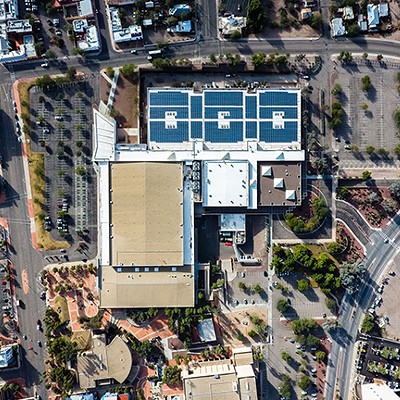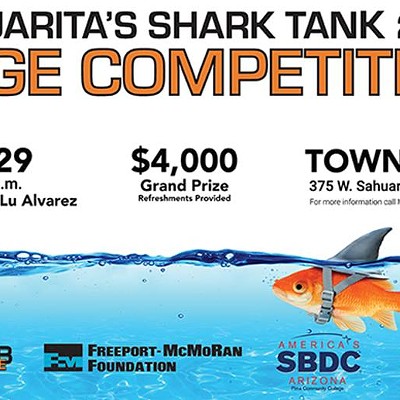Think again. Even if voters were to pass Proposition 200 in November, and Tucson Water were to be prohibited from providing service to new customers, developers have the option of tapping directly into the aquifer and pumping up groundwater.
Prop 200, an initiative spearheaded by former state lawmaker John Kromko, would prohibit Tucson Water from hooking up any new customers without voter approval once the utility is delivering 140,000 acre-feet of water annually. (It would also repeal the city's $14-a-month trash fee and ban the recharge of treated effluent for future home delivery.)
Kromko says that 140,000 acre-feet corresponds to the city's annual Central Arizona Project allotment, although the city is actually eligible for about 144,000 acre-feet of CAP water.
The proposition would require Tucson Water to project what year it would begin delivering 140,000 acre-feet of water, which Kromko estimates to be about a decade from now. (Kromko says the initiative refers to potable, or drinkable, water, but City Attorney Mike Rankin says that definition of water could include reclaimed water, so the threshold could arrive much sooner; see The Skinny for details.)
Two years before reaching that threshold, the city could ask voters if they wanted to lift the cap and agree to more water connections. If voters say no, then Tucson Water would not be allowed to add more customers, whether the new customer is a new master-planned community or a homeowner wishing to add a guest house to his property.
Tucson Water would also have to cut off any new connections if the amount of CAP water being delivered to the city was reduced by 20 percent or more as the result of a shortage on the Colorado River.
Dave Modeer, director of Tucson Water, says that if the city utility can't hook up new customers, developers have the option of joining the Central Arizona Groundwater Replenishment District, which would allow them to tap directly into the aquifer, as long as they pay to recharge water somewhere inside the Tucson Active Management Area.
That means builders could tap into the city's central well field, which has been slowly rebounding as Tucson Water has been turning off central-city wells and delivering more water from the Avra Valley facility, where CAP water is being recharged. Or they could pump groundwater on Tucson's southeast side, where hundreds of thousands of acres of state land are slated for future development.
Either way, state law doesn't require developers to recharge water in the same place that they pump it, so they can deplete well fields in the central city or on the southeast side while recharging water in Avra Valley.
"They don't have to replenish it in the area where they pump it out," says Modeer. "The failure in the CAGRD is that while you're paying to replenish, gallon for gallon, all the water that you pump out of the ground, it doesn't go where the water is being pumped."
For example, water that is pumped out from beneath the Green Valley area south of Tucson is recharged in Avra Valley.
"It never really gets replenished," Modeer says. "It's a paper balance."
If Prop 200 passes, then developers would be able to use the same mechanism to pump water from anywhere in Tucson Water's service area, which will reverse efforts by the utility to turn off wells and deliver water from the recharge facility in Avra Valley.
Kromko admits that developers will be able to tap the aquifer wherever they like, because they have that right under a state law "that we can't influence at all with a city initiative. Whatever it is developers can do today, they'll be able to do it after November, whether this initiative passes or not."
But Kromko argues that water will be hard to come by in the future, which will limit the ability of developers to join the Central Arizona Groundwater Replenishment District.
"The replenishment district is running out of water, also," Kromko says.
Modeer agrees that water will be more expensive and less available in the future, but it's future homeowners, not developers, who will bear the burden.
"For the developer, it's probably never going to be exorbitantly expensive," Modeer says. "It will be very expensive water for the homeowner 10, 15 years from now as it becomes much more expensive for the CAGRD to find water."
Prop 200 also raises the question of how much renewable water the city has. The initiative sets that number at 140,000 acre-feet, although it allows voters to increase that threshold. Kromko says city officials are overestimating the amount of groundwater that can be pumped on top of the annual CAP allotment, because the ongoing drought is not replenishing the natural supply.
"I think the groundwater supply is not as reliable as they think," Kromko says.
But Modeer points out that state officials say that Tucson Water can safely deliver more than 190,000 acre-feet of water annually for the next 100 years, once the entire CAP allotment, natural recharge and other factors are taken into account.
Kromko dismisses those figures as a "mirage."
"You can take it to the bank that we do not have a 100-year assured water supply," he says.

















